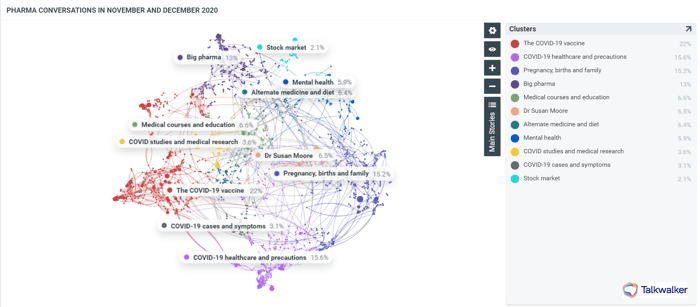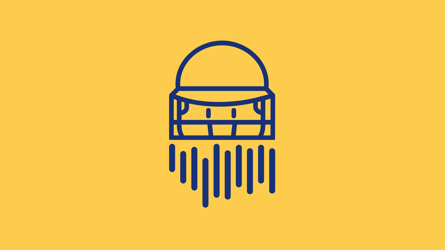The main focus is to ensure that the latest and most up-to-date information on the COVID vaccine is readily available, with another part of their marketing strategy to be limiting the spread of misinformation about the COVID vaccine, which has severely disrupted the adoption of vaccines all over the world. But for the purpose of this blog, I wanted to highlight the change in the pharmaceutical industry in India.
Today, more than ever, it’s become important for pharma companies to keep a close eye on conversations regarding the vaccine and pandemic, so that they can be reactive when it comes to changing their communications strategy, while at the same time protecting their reputation.
Conversations dictating today’s pharma marketing strategies
Here’s a look at the number of mentions of the pharmaceutical industry on social media in India over the last six months. As can be seen, there’s a pretty big spike in the number of mentions this January and most of it has to do with the COVID vaccines and subsequent distribution in India.

The most popular result here is a tweet by PM Narendra Modi.
At the Bharat Biotech facility in Hyderabad, was briefed about their indigenous COVID-19 vaccine. Congratulated the scientists for their progress in the trials so far. Their team is closely working with ICMR to facilitate speedy progress. pic.twitter.com/C6kkfKQlbl
— Narendra Modi (@narendramodi) November 28, 2020
But of course, we’re more interested in knowing about the general theme of conversations around the pharmaceutical industry, rather than the most popular tweets.
Here’s a quick look at the top pharma companies that have been in the limelight in India in Q4 2020.
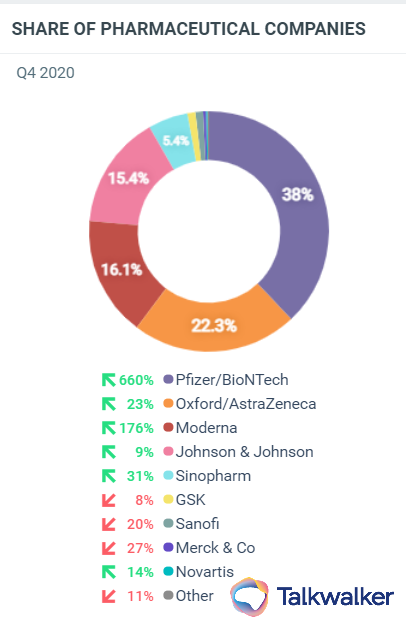
It’s no surprise that Pfizer stole the show since their announcement. However, since the Oxford vaccine is primarily manufactured in the Serum Institute labs in India, it comes a close second, followed by Moderna, which is supposed to be the most efficient vaccine. But more on that later.
COVID conversations then and now
It’s been almost a year since the lockdown started in India. Everything from pharma companies, vaccines, and banana bread has been the topic of conversation in that period of time. Several makeovers have been given to pharma brand marketing strategies. Let’s have a look at the results of those efforts and the evolution of conversations since the lockdown.
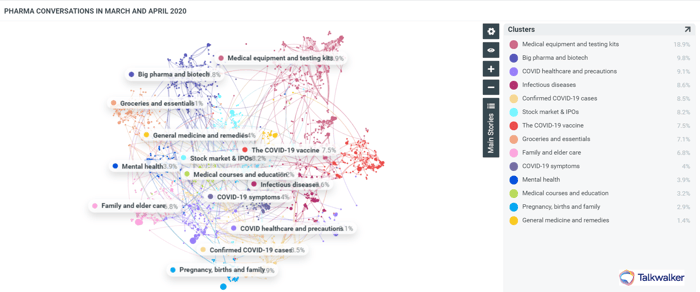
In the early phase of the lockdown, people were mainly talking about medical equipment, testing facilities and large pharma brands. Everything from donations by the Bill Gates Foundation, Azim Premji, the Tata Group, etc., was in the news. Of course, people were also keeping track of the number of COVID cases, symptoms, and more.
As time passed, the conversation evolved. Here’s a look at conversations at the end of last year.
The biggest topic of conversation was the COVID-19 vaccine towards the end of last year - and while the government is still figuring out how to efficiently distribute the vaccine, it was a relief when the first vaccines were announced!
Some of the most talked about things were the PM’s visit to the Zydus Biotech Park in Ahmedabad. Additionally, Pfizer’s vaccine and its potential side effects (with respect to allergies) were a pretty big topic of discussion.
Focus on some big pharma companies
As pharma brand marketing strategies go, a few big players are leading the pack. Of course, consumers are the real stars here as they (indirectly) dictate the strategies . Which brings us to the question: What are consumers most concerned about when it comes to vaccines?

Naturally, any pharma brand’s marketing strategy would be designed to address these concerns.
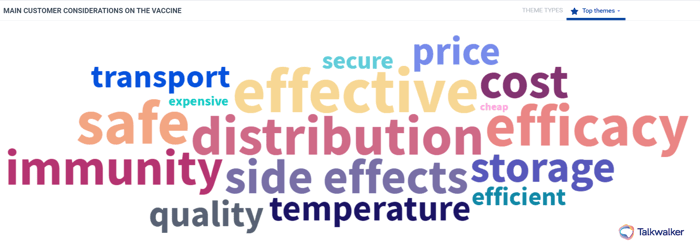
Let’s have a look at what some large pharma companies are doing in this regard.
Oxford/AstraZeneca: No discussion around vaccinations in India is complete without mention of the Oxford/AstraZeneca vaccine. Manufactured by Adar Poonawalla’s Serum Institute, this vaccine has taken the country and the world by storm. Even before phase 3 trials were complete, Poonawalla bet on the Oxford vaccine and started manufacturing it last year. Today it produces around 5000 doses every minute.
Bharat Biotech: Hyderabad based, Bharat Biotech has produced India’s own vaccine, in collaboration with the Indian Council of Medical Research (ICMR). This vaccine was approved for use, though it had not undergone phase 3 trials at the time.
Pfizer: Pfizer has run into something of a setback in India as its usage in the country has been denied by the government. The drug regulator in India has asked Pfizer to conduct local trials for safety purposes. Since trials had not been done specifically for the Indian population, this meant that Pfizer was denied approval. Additionally, given that it requires storage in extremely low temperatures, the vaccine isn’t best suited for distribution in a hot, tropical country, such as India.
Moderna: The Tata Group is planning to launch the Moderna vaccine in India after conducting research and trials on the Indian population, to determine its safety. This is, in fact, the main reason why international companies always tie up with local companies in India. Storage and distribution of this vaccine is relatively hassle-free and considering its international efficiency, there is hope that the Tata Group - one of India’s most respected industrial groups - can successfully bring this vaccine to the country.
COVID vaccine misinformation
It’s not news that there are people vehemently opposed to vaccination. A robust pharma brand marketing strategy is always in place to counter this, but due to the intense interest in the subject, additional measures needed to be implemented. It’s actually gotten so bad that Facebook has instituted a ban on vaccine misinformation on their platform and chosen instead to highlight official information.
Facebook is also offering $120 million in ad credits to government and regulatory bodies and the UN to promote relevant, correct information about the pandemic and vaccines. Since Facebook has such a huge reach, this is definitely an efficient way to ensure that the right information reaches as many people as possible.
Additionally, this kind of information is also doing the rounds on other platforms like YouTube, Instagram, and so on. Last July, YouTube suspended BigTree’s channel for spreading information on COVID. The channel had more than 350,000 followers, and has been spreading misinformation around the vaccine.
The problem with the spread of misinformation online is that it is not limited to online, but has far reaching effects offline as well. For instance, a pharmacist in Wisconsin tried to destroy hundreds of doses of the COVID vaccine because he believed that it could have adverse effects on people’s DNA.
That’s just one instance of the real world consequences of the false information circulating on social media with regards to the COVID vaccine.
Conclusion
Pharmaceutical companies are in the race for the COVID vaccine today and this is one race that we can all get behind, so that life goes back to normal and the pandemic is brought under control. But while logistics, distribution and operations are the main areas of focus for all pharma brands at the moment, it is important for them to keep their finger on the pulse of consumer conversations with a solid marketing strategy. This is key to help adapt their strategy and drive adoption of the vaccine and end COVID once and for all.


